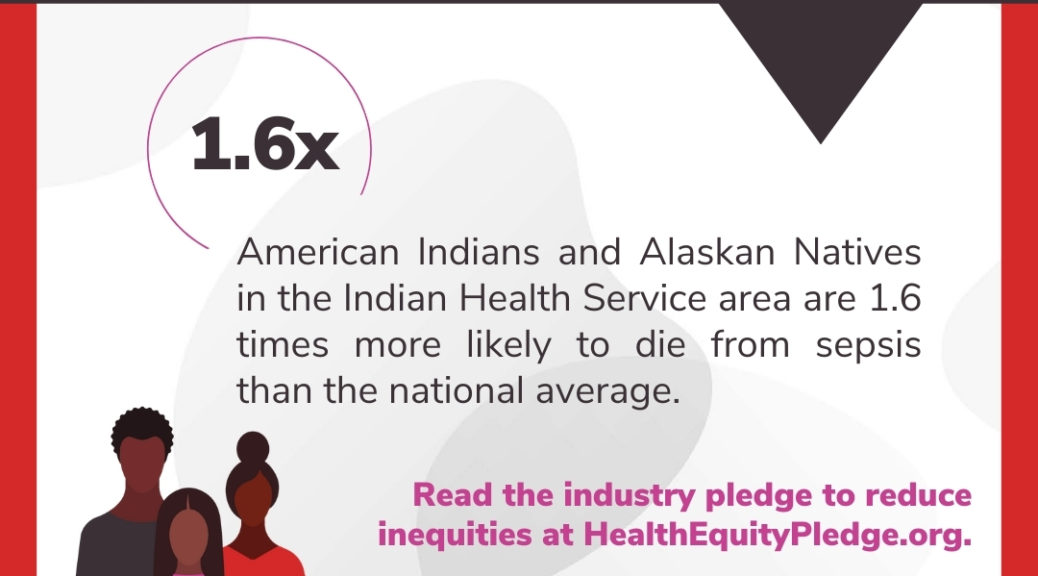
Take the Pledge at HealthEquityPledge.org
“We are challenging our health sector colleagues to join us in this fight, recognizing the additional work needed to save lives, end disparities, and reduce suffering for all people.”
SAN DIEGO (PRWEB)
July 19, 2021
Sepsis Alliance, the nation’s first and leading sepsis organization, is calling upon its health sector colleagues to sign a new equity, diversity, and inclusion (EDI) pledge to help close gaps in awareness, incidence, treatment access, and outcomes in these key areas: antimicrobial resistance (AMR), sepsis, or its underlying causes.
Sepsis is the body’s overwhelming and often deadly response to infection; it can be caused by bacterial, parasitic, fungal, or viral infections like COVID-19, and it often requires effective antimicrobials for treatment. Sepsis is the leading cause of death in U.S. hospitals, with over one-third of all hospital deaths attributable to sepsis. 270,000 people in the U.S. die from sepsis every year – more than from prostate cancer, breast cancer, and opioid overdoses combined.
For patients of color, the burden of sepsis is even greater: Native American patients are 2.39 times more likely to be readmitted following a sepsis hospitalization than white patients, for example; Hispanic individuals experience 1.1 times the rate of severe sepsis as compared to white individuals; and Black individuals bear nearly twice the burden of sepsis deaths, relative to the size of the Black population, as compared to white individuals. What’s more, drug-resistant infections—from which 700,000 people die annually, and which pose a growing threat to sepsis prevention and treatment—also disproportionately impact populations of color. For instance, in the U.S., Black patients are twice as likely to die from severe infections driven by antibiotic resistance as compared to white patients. Many of these deaths are sepsis deaths.
“Communities of color experience a disproportionate burden of sepsis-related suffering,” explain Sepsis Alliance Advisory Board members Dr. Selena Gilles and Dr. Sandy Cayo in a sepsis.org op-ed “Research has shown that despite standardization of care, wide variability in mortality rates remain, with minority populations having increased incidence, hospitalizations, and complications when compared to white populations.” In light of such alarming statistics, continue Dr. Gilles and Dr. Cayo, “equitable, timely sepsis care, education, and support for at-risk and underserved communities is important now more than ever.”
Today, Sepsis Alliance invites its health sector colleagues to join in this vital, life-saving fight to promote much-needed equity work in sepsis-related fields. Per the EDI pledge, developed with support from Pfizer Inc., disparities warrant our significant attention and action, in everything from infectious disease research to vaccine distribution to sepsis care advocacy.
“Infectious diseases like sepsis don’t discriminate, and neither should accessibility to treatment and support,” said Angela Lukin, Global President, Pfizer Hospital. “Pfizer is committed to helping curb the spread of antimicrobial resistance and minimizing the impact of infectious diseases. We are proud to join Sepsis Alliance with a pledge to help tackle these inequalities and identify solutions – to help ensure that people suffering from these diseases, regardless of their circumstances, have access to high-quality care and resources.”
The pledge aims to engage health-sector organizations of all types—from large pharmaceutical companies to small advocacy groups. For each type of signatory, the pledge offers suggested equity actions from which an organization can choose; or, an organization can propose equity actions of their own, and report on their selections and progress. Pfizer Inc. is the first signatory.
This pledge follows on the heels of Sepsis Alliance’s own equity pledge and action plan released in early 2021, which includes organizational commitments to foster equity broadly throughout the sepsis care community and across the continuum of care.
“Sepsis Alliance is committed to equity, diversity, and inclusion in all of our work, but we know that making the largest impact requires a commitment from all organizations in the healthcare field,” says Tom Heymann, President and CEO of Sepsis Alliance. “We are challenging our health sector colleagues to join us in this fight, recognizing the additional work needed to save lives, end disparities, and reduce suffering for all people.”
For further information about the EDI initiative and to sign the pledge with your organization, please visit http://www.HeatlhEquityPledge.org.
Sepsis Alliance gratefully acknowledges support from Pfizer for the creation of this pledge.
About Sepsis Alliance
Sepsis Alliance, the first and leading sepsis organization in the U.S., seeks to save lives and reduce suffering by improving sepsis awareness and care. More than 1.7 million people are diagnosed with sepsis each year in the U.S. with more than 270,000 dying and over 50% of survivors experiencing post-sepsis syndrome and other lingering effects, including amputations. At Sepsis Alliance’s founding in 2003, only 19% of U.S. adults were aware of the term “sepsis.” After over ten years of educational efforts for the general public and healthcare providers through Sepsis.org, Sepsis Alliance Clinical Community, Sepsis Alliance Institute, and Sepsis Alliance Voices, awareness is at an all-time high of 71% with over 20,000 healthcare providers across the country having attended sepsis webinars and courses to elevate their practice and over 28 Sepsis Awareness Month state proclamations. Sepsis Alliance is a 501(c)3 nonprofit and a GuideStar Platinum Rated charity. For more information, please visit http://www.sepsis.org and connect with Sepsis Alliance on Facebook, Twitter, Instagram, and LinkedIn at @SepsisAlliance.
Share article on social media or email:

